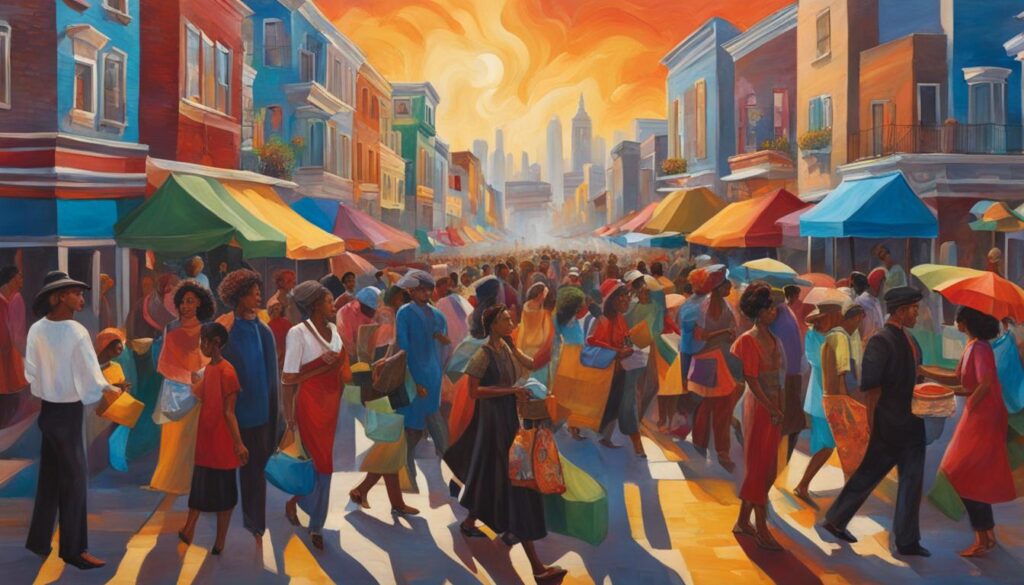American culture encompasses a wide range of customs, traditions, and values that have evolved over centuries as a result of diverse historical, social, and cultural influences. From the urban streets of New York City to the rural landscapes of the American heartland, the United States is a country teeming with cultural vibrancy and diversity.
The American way of life is defined by an ethos of individualism, freedom, and self-determination, and this is reflected in the country’s social norms, political institutions, and cultural expressions. From its art, music, and literature to its holidays, customs, and celebrations, American culture is a rich and multifaceted tapestry that continues to evolve and shape the nation to this day.
In this section, we will explore the various facets of American culture, from its historical roots to its contemporary expressions, to provide a comprehensive overview of one of the world’s most dynamic and fascinating cultural landscapes.
Key Takeaways
- American culture is diverse and multifaceted, shaped by historical, social, and cultural influences.
- Core values such as individualism, freedom, and self-determination are deeply ingrained in American society.
- From art, music, and literature to holidays and customs, American culture is a rich tapestry that continues to evolve and adapt.
- America’s cultural diversity is a testament to its immigrant heritage.
- Exploring American culture enables a better understanding of the nation and its people, fostering appreciation and respect for its rich heritage.
Understanding American Traditions
American traditions are an essential aspect of the United States culture, playing a vital role in defining the American society and lifestyle. These traditions have been shaped by the country’s history, diverse communities, and shared values.
One of the most widely celebrated American traditions is Thanksgiving Day, which originated from the pilgrims’ harvest festival in the 17th century. It’s a day for families and friends to gather, express gratitude and enjoy a hearty feast. Another popular holiday is Christmas, marked by special decorations, gift exchanges, and religious services.
American cultural norms and customs vary greatly by region and ethnicity. For instance, in the southern states, barbeques, picnics, and crawfish boils are popular outdoor activities, while in the northeast, clam bakes and lobster boils are more common. Similarly, the Mardi Gras carnival of New Orleans, the Cinco de Mayo festival of Mexican heritage, and the Hanukkah celebrations of the Jewish community are unique examples of cultural traditions in America.
American lifestyle is also intertwined with various customs, such as tipping in restaurants, pledging allegiance to the flag, and observing the national anthem at public events- all of which reflect the cultural values of the society.
American traditions are an integral part of the United States culture, reflecting the country’s heritage, norms, and diversity. Understanding these traditions can help people appreciate and respect the values that define the American way of life.
Uncovering American History
American history is a captivating tapestry of events, movements, and people that have shaped the nation. From the Revolutionary War to the Civil Rights Movement, there are many pivotal moments that have left an indelible mark on the country’s cultural fabric.
Throughout history, American culture has been shaped by various influential figures such as Abraham Lincoln, Martin Luther King Jr., and Susan B. Anthony. Their contributions and legacies continue to inspire and impact society today.
The United States is also home to many iconic landmarks that reflect its rich historical heritage. From the Statue of Liberty to the Washington Monument, these monuments serve as tangible testaments to the American spirit.
The diverse heritage and customs that contribute to the cultural mosaic of the United States are celebrated through various national holidays such as Independence Day, Thanksgiving, and Martin Luther King Jr. Day. These holidays not only commemorate significant events but also reflect the values that make up the American identity.
Exploring American history provides insight into the diverse and complex cultural traditions that shape American society and lifestyle. It also highlights the importance of cherishing and preserving American heritage for the benefit of future generations.
Exploring American Values
Values are an integral part of American society and culture. The United States is often seen as the land of the free, where individuals have the power to shape their own destiny. This belief in individualism is a cornerstone of American ideology, reflected in the country’s political, economic, and social systems.
American values also prioritize the pursuit of happiness, which refers to the desire for personal fulfillment and satisfaction. This includes the freedom to choose one’s own career, hobbies, and lifestyle. Additionally, equality is another critical value that underpins American society—a notion that everyone is created equal and deserves respect, regardless of their background or beliefs.
Furthermore, American values emphasize the importance of freedom. Americans are known for their love of liberty, which is evident in the country’s history, from the fight for independence to the ongoing struggles for civil rights. This value allows individuals to express their views freely and participate in civic life.
It is important to note that these fundamental values are not static, they have evolved and continue to evolve in response to societal changes. Incorporating these values in everyday life is at the core of American lifestyle and cultural values.

American culture is a way of life, and its values define the essence of what it means to be American.
Celebrating American Arts and Entertainment
American culture has been widely recognized for making influential contributions to the arts and entertainment industry worldwide. From the birth of jazz music to the rise of Hollywood cinema, American art and music have had a significant influence on global popular culture.
The entertainment industry is a thriving sector in the United States. Hollywood, California, is home to the world’s most influential movie studios, producing films that have captivated audiences worldwide. Many Hollywood blockbuster movies have gone on to achieve significant commercial success, such as “Titanic,” “Jurassic Park,” and “The Avengers.”
Modern American Music Genres
American music has played a vital role in shaping the culture and society of the United States. A broad range of music genres, including jazz, country, hip hop, and rock, originated in America and has influenced global music trends for decades.
| Music Genres | Origins |
|---|---|
| Jazz | New Orleans, Louisiana |
| Country | Southern United States |
| Hip hop | Bronx, New York City |
| Rock | Cleveland, Ohio |
Other genres, such as blues, gospel, and soul, have also contributed to the creation of American music and the influence it has had on music worldwide.
Notable American Artists
The United States is home to some of the most celebrated artists, authors, and musicians in the world:
- Leonardo DiCaprio, one of the highest-paid actors in Hollywood
- Maya Angelou, an award-winning author, and poet known for her works on racism and sexism
- Whitney Houston, an acclaimed American singer known for her powerful vocal range and pop hits
- Elvis Presley, an iconic American rock and roll singer and Hollywood actor
The works of these and other artists have made a considerable impact on American culture, contributing to the country’s rich artistic legacy.
The Future of American Arts and Entertainment
American entertainment continues to evolve, with advancements in technology and new forms of media influencing the industry’s direction. Many independent filmmakers, musicians, and artists are embracing new platforms to showcase their creativity, providing new avenues for discovering and experiencing American arts and entertainment.
The future of American arts and entertainment is exciting, with the industry continuing to innovate and explore new ways to share its creative offerings with audiences across the globe.
Embracing Cultural Diversity in America
American culture is renowned for its diversity, which is a reflection of the country’s immigrant heritage. The United States is a melting pot of cultures, languages, and traditions that have evolved and adapted over time, creating a unique mix of heritages that thrive within American society. The celebration of cultural diversity in America has become an integral part of the nation’s identity, manifesting in various ways such as festivals, foods, music, and arts that showcase the rich contributions and experiences of diverse communities across the nation.
From Italian Americans to Chinese Americans, African Americans to Irish Americans, and Hispanic Americans to Jewish Americans, the United States has numerous cultures that have distinct customs, values, and beliefs, yet coexist harmoniously within the wider American society. Through mutual respect, inclusivity, and appreciation of each other’s differences, Americans can foster a sense of unity while preserving their unique cultural identities.
The American lifestyle is enriched by cultural diversity, and the values of acceptance, tolerance, and inclusiveness remain central to the national ethos. By embracing cultural diversity, Americans can broaden their perspectives, cultivate empathy, and form meaningful connections with people from diverse backgrounds. The United States is a shining example of how cultural diversity can be a source of strength and pride rather than division and hostility.
Understanding American Identity
American identity is a product of the country’s unique history, cultural diversity, and values. The United States of America is a nation of immigrants whose contributions have shaped American society, cultural norms, and beliefs. It is a dynamic identity that continues to evolve as society progresses, reflecting the country’s diverse tapestry.
The core of American identity is shaped by the country’s values, which include individualism, democracy, freedom, equality, and the pursuit of happiness. These values are deeply ingrained in American society and lifestyle, influencing the perceptions and beliefs of its citizens.
The American society is known for its cultural pluralism, where different cultural and ethnic communities coexist alongside each other. This pluralism has led to a unique cultural identity that is celebrated by Americans and recognized around the world. Americans have a diverse range of beliefs, including religious beliefs, political ideologies, and social norms. These beliefs reflect the diverse perspectives and experiences that have contributed to shaping American identity over the centuries.

“The identity of America lies not in the monuments of its cities, but in the spirit of its people.”
– Calvin Coolidge
Understanding American identity is crucial for appreciating the country’s cultural heritage and unique way of life. Through a thoughtful exploration of the country’s history, values, and cultural diversity, we can gain a deeper understanding of American society, lifestyle, and beliefs.
Cherishing American Heritage
American heritage is a valuable treasure trove of memories, customs, and artifacts that connect present-day Americans to their past. Preserving and cherishing this heritage contributes to cultural continuity and national pride, enriching the sense of identity and belonging for all Americans.
One of the most poignant ways to cherish American heritage is by visiting the many sites and landmarks that have played significant roles in the nation’s history. From the Statue of Liberty in New York to the Golden Gate Bridge in San Francisco, these landmarks hold immense historical and cultural importance.
On a smaller scale, many communities preserve various heritage sites, such as historic homes, parks, and museums, offering a closer and more personal look into the country’s past. These sites are rich in cultural significance and promote a better understanding of American customs and traditions.
Examples of American Customs and Traditions
| Custom/Tradition | Description |
|---|---|
| Thanksgiving Day | An annual holiday that originated from a harvest feast between Native Americans and Pilgrims in 1621. |
| Fourth of July | A day commemorating the Declaration of Independence in 1776, marked by fireworks and patriotic festivities. |
| Bald Eagle | The national bird and symbol of the United States, representing freedom and strength. |
| Baseball | An iconic American sport that originated in the mid-19th century, reflecting American values of teamwork, perseverance, and fair play. |
Cherishing American heritage is vital in recognizing the country’s cultural diversity and the evolution of its society over time. By acknowledging and cherishing this heritage, Americans can maintain a sense of pride and respect for their past while embracing the future.
Navigating American Cultural Norms
American society has a set of unwritten rules and etiquettes that characterize social interactions. Understanding these norms is essential to avoid cultural missteps that may cause discomfort or misunderstanding. Here are some of the critical cultural norms to keep in mind:
| Cultural Norms | Description |
|---|---|
| Small Talk | American culture values small talk as a way of building rapport with others. It includes discussing light topics such as the weather, sports, or family. This practice helps establish a comfortable environment and sets the tone for more in-depth conversation. |
| Punctuality | Being on time is highly valued in American culture. Arriving late is often seen as a sign of disrespect or lack of consideration for other people’s time. It is recommended to arrive a few minutes early to appointments or social events as a sign of respect. |
| Personal Space | American society values personal space, and people often maintain a distance of at least a few feet from each other to ensure comfort and privacy. Invading someone’s personal space, especially without permission, is viewed as rude and inappropriate. |
| Tipping | Tipping is standard in American culture for many services, such as restaurants, taxis, and hair salons. The general rule of thumb is to tip at least 15-20% of the total bill, depending on the quality of service. Not tipping is considered impolite and may offend the service provider. |
| Eye Contact | American culture considers eye contact as a sign of respect and attentiveness. Direct eye contact during a conversation signifies that the person is listening and engaged in the discussion. Avoiding eye contact may be perceived as disinterest, dishonesty, or disrespect. |
While these cultural norms are not explicit rules, they provide guidance for social interactions and can influence how people perceive and respond to others. By understanding and respecting American cultural norms, individuals can build positive relationships and navigate social situations with ease.
Conclusion
In conclusion, American culture is a vibrant and diverse tapestry woven from traditions, history, values, arts, and customs. It reflects the unique fabric of the United States and continues to evolve as society progresses. Exploring the various facets of American culture enables a better understanding of the nation and its people, fostering appreciation and respect for its rich heritage.
By delving into the different sections of this article, readers will gain insights into the intricate nuances and complexities of American culture, including its history, traditions, values, and norms. These sections aim to provide a comprehensive overview of American culture while highlighting its diverse elements that make it unique and vibrant.
By exploring American culture, individuals can gain a deeper appreciation for the country and its people, as well as an understanding of the complexities that shape its society and lifestyle. The richness and vibrancy of American culture make it one of the most fascinating aspects of the country, and its diverse elements continue to influence the world in numerous ways.
Overall, this article offers readers an exciting journey into the multifaceted world of American culture, showcasing its diverse traditions, history, values, arts, and customs. Through this exploration, we hope to inspire curiosity, respect, and appreciation for the vibrant tapestry that defines the American way of life.
FAQ
What are some American traditions?
American traditions encompass a wide range of cultural practices. Some notable traditions include celebrating Thanksgiving, participating in Independence Day festivities, and engaging in trick-or-treating on Halloween.
What important events have shaped American history?
American history is marked by significant events such as the American Revolution, the Civil War, the Civil Rights Movement, and the moon landing. These events have had a profound impact on shaping the nation.
What values are influential in American society?
American society is shaped by core values such as individualism, liberty, equality, and the pursuit of happiness. These values are deeply ingrained in the American ethos.
What are some renowned contributions of American arts and entertainment?
American arts and entertainment have made remarkable contributions on a global scale. From Hollywood movies and Broadway shows to jazz, rock ‘n’ roll, and hip-hop, American cultural expressions have influenced societies worldwide.
How does cultural diversity manifest in America?
Cultural diversity is a hallmark of American society. People from various backgrounds, ethnicities, and religions contribute to the rich fabric of American cultural diversity, bringing forth a multitude of languages, cuisines, traditions, and perspectives.
How would you define American identity?
American identity is multifaceted, encompassing a sense of shared history, values, and aspirations. It is shaped not only by birthright but also by the adoption of American ideals and cultural assimilation.
Why is it important to celebrate and preserve American heritage?
Preserving American heritage is crucial in fostering a sense of national pride and cultural continuity. It allows current and future generations to connect with their roots, learn from history, and appreciate the diverse elements that constitute American culture.
What are some cultural norms observed in America?
American cultural norms encompass etiquette, manners, and behavioral expectations. Examples include greeting with a handshake, punctuality, and respecting personal space. Understanding these norms helps individuals navigate social interactions in American society.
